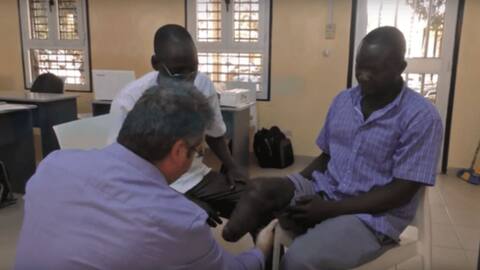3D-printed artificial limbs reach patients in Madagascar and Togo
What's the story
US-based organization Humanity & Inclusion (HI), formerly known as Handicap International, is bringing 3D-printed prosthetic and orthopedic support to Madagascar and Togo. Patients in these countries are provided with artificial limbs that are created using 3D scanners and 3D printers. This comes as a part of "Impact 3D," a program launched in November 2017 and funded by the Belgian Development Agency.
Background
Up to 15% population in Madagascar, Togo requires prosthetic limbs
In developing countries, specialists can be scarce and materials cost high. Patients are at the risk of receiving poorly made or unadjusted artificial limbs which can cause skin sores, pressure wounds, and muscle fatigue. Now with HI's initiative, "scans can be sent directly by telephone to the specialist making the digital orthotic on a 3D printer," said Simon Miriel, Manager at Impact 3D.
Details
The 3D printing solution can reduce costs and time lag
This is a trial project by HI. Under it, first, a small, lightweight 3D scanner creates a digital mold of an amputated limb. Doctors adapt this mold according to patients' needs through a computer modeling software. It is then sent to a 3D printer which creates thousands of layers of thermoplastic and a socket that correspond perfectly to the shape of the amputated limb.
Information
Phase two of the research
"These trials will involve more patients in different locations in order to thoroughly test our methods. 3D printing is unlikely to become the only way of providing prosthetics but it could be a great option in certain circumstances," said Isabelle Urseau, Head of Rehabilitation, HI.
